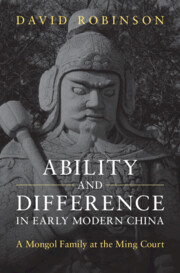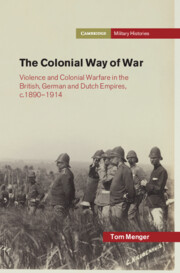Refine search
Actions for selected content:
15366 results in Military history
4 - “It Must Be Nice to Be That Sure”: July 1965–December 1966
-
- Book:
- Less Than Victory
- Published online:
- 16 October 2025
- Print publication:
- 11 September 2025, pp 103-140
-
- Chapter
- Export citation
Abbreviations
-
- Book:
- Less Than Victory
- Published online:
- 16 October 2025
- Print publication:
- 11 September 2025, pp xi-xii
-
- Chapter
- Export citation
1 - “I Am a Roman Catholic”: 1950–1959
-
- Book:
- Less Than Victory
- Published online:
- 16 October 2025
- Print publication:
- 11 September 2025, pp 14-50
-
- Chapter
- Export citation
Emperors of the Ming Dynasty
-
- Book:
- Ability and Difference in Early Modern China
- Published online:
- 10 September 2025
- Print publication:
- 11 September 2025, pp viii-viii
-
- Chapter
- Export citation
Epilogue: “We Speak as Moral Teachers”
-
- Book:
- Less Than Victory
- Published online:
- 16 October 2025
- Print publication:
- 11 September 2025, pp 284-294
-
- Chapter
- Export citation
Index
-
- Book:
- Ability and Difference in Early Modern China
- Published online:
- 10 September 2025
- Print publication:
- 11 September 2025, pp 271-282
-
- Chapter
- Export citation
Contents
-
- Book:
- Ability and Difference in Early Modern China
- Published online:
- 10 September 2025
- Print publication:
- 11 September 2025, pp v-v
-
- Chapter
- Export citation
6 - “Wearing a Little Thin”: May 1968–March 1970
-
- Book:
- Less Than Victory
- Published online:
- 16 October 2025
- Print publication:
- 11 September 2025, pp 176-213
-
- Chapter
- Export citation
Dedication
-
- Book:
- Less Than Victory
- Published online:
- 16 October 2025
- Print publication:
- 11 September 2025, pp v-vi
-
- Chapter
- Export citation
Figures
-
- Book:
- Less Than Victory
- Published online:
- 16 October 2025
- Print publication:
- 11 September 2025, pp viii-viii
-
- Chapter
- Export citation
5 - “We Can and Must Debate”: January 1967–April 1968
-
- Book:
- Less Than Victory
- Published online:
- 16 October 2025
- Print publication:
- 11 September 2025, pp 141-175
-
- Chapter
- Export citation
6 - Far from Home
-
- Book:
- Ability and Difference in Early Modern China
- Published online:
- 10 September 2025
- Print publication:
- 11 September 2025, pp 138-162
-
- Chapter
- Export citation
5 - Representing the Emperor
-
- Book:
- Ability and Difference in Early Modern China
- Published online:
- 10 September 2025
- Print publication:
- 11 September 2025, pp 115-137
-
- Chapter
- Export citation

Ability and Difference in Early Modern China
- A Mongol Family at the Ming Court
-
- Published online:
- 10 September 2025
- Print publication:
- 11 September 2025

The Colonial Way of War
- Violence and Colonial Warfare in the British, German and Dutch Empires, c.1890–1914
-
- Published online:
- 04 September 2025
- Print publication:
- 21 August 2025
Index
-
- Book:
- The Wars of the Roses
- Published online:
- 24 July 2025
- Print publication:
- 04 September 2025, pp 296-304
-
- Chapter
- Export citation
Copyright page
-
- Book:
- The Wars of the Roses
- Published online:
- 24 July 2025
- Print publication:
- 04 September 2025, pp iv-iv
-
- Chapter
- Export citation
Dedication
-
- Book:
- The Wars of the Roses
- Published online:
- 24 July 2025
- Print publication:
- 04 September 2025, pp v-vi
-
- Chapter
- Export citation
The Royal Family Tree
-
- Book:
- The Wars of the Roses
- Published online:
- 24 July 2025
- Print publication:
- 04 September 2025, pp xviii-xviii
-
- Chapter
- Export citation
Chronology of the Wars
-
- Book:
- The Wars of the Roses
- Published online:
- 24 July 2025
- Print publication:
- 04 September 2025, pp 253-265
-
- Chapter
- Export citation
